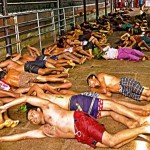Mumbai: Crime against women, including rape, molestation and chain snatching, have risen sharply in the metropolis in 2013-14, while conviction rate of serious offences fell to an abysmal low of eight per cent, showed a report complied by an NGO.
A sharp ascent is recorded in number of crime against women, with number of rape cases escalating to 432 from 294 in 2013-14 (a 47 per cent rise), while molestation cases rose by 52 per cent (from 793 to 1,209), according to data gathered through RTI for financial year 2013-14, which was released here today by Mumbai-based NGO Praja Foundation.
While security of women remains a serious concern, police department has been facing acute manpower crunch over the last many years.
Incidences of chain snatching too shot up to 2,110, which is 66 per cent higher compared to last year.
Among other crimes, theft cases were up by 19 per cent to 6,644 cases, while housebreaking and rioting cases too saw an increase of 17 and 8 per cent to 3,012 cases and 387 cases, respectively.
“Victims may have been coming forward and lodging complaints without any fear and hence there may be a rise in reported cases at the 92 police stations across the city, but such crimes must be curbed,” founder trustee of the NGO, Nitai Mehta said.
Tasked to protect a population of over two crore people, Mumbai police continues to grapple with less number of head-counts. As many as 4,484 posts (11 per cent) remains vacant as against its sanctioned strength of 41,643 as on July, 2014.
Strength of middle-level officers such as assistant police inspectors (APIs) and police sub-inspectors (PSIs), who primarily investigate cases, is also very less, the review said.
“There are 880 APIs instead of 1,047 sanctioned, and 2,024 PSIs while 3,254 posts are sanctioned. PSIs and APIs are the ones who are actually trained to probe crimes,” Mehta said.
With a large number of shortage of PSIs and APIs, it
is little wonder that chargesheets are not being filed for lack of investigation into crimes, he added.
“Improvement in strength will lead to better probe and thus good rate of conviction. Low strength of investigators is one of the reasons why conviction rate is alarmingly low at eight per cent in 2013. However, it is one per cent higher than last year. This encourages criminals to carry out more offences,” he claimed.
A total of 54,163 cases of serious offences involving bodily harm, murder, rape, grievous hurt, kidnapping and abduction etc were tried in the courts in 2013, of which trial was completed in nine per cent cases (4,862).
Of the 4,862 cases in which judgement was delivered, accused in only 403 cases (eight per cent) were convicted.
In the area-wise break-up, North Central Mumbai has topped the list of housebreakings, thefts and vehicle theft cases with 734, 1,598 and 819 cases respectively in 2013-14.
Incidentally, former MLAs of the region such as Kripashankar Singh, Krishna Hegde, Milind Kamble, Prakash Sawant, MLA Baba Siddique showed little interest in asking questions on crime issues, the NGO claimed.
“The MLAs (now former MLAs) asked lowest number of 341 questions on crime issues between the budget session 2009 and Monsoon session 2014,” the report said.
As far as Railway Police is concerned, nearly five passengers face accidental deaths everyday on the Mumbai Rail network system.
Kurla railway station witnessed maximum number of accidental deaths (444), followed by Borivali station with 345 deaths recorded in 2013.
In 2012, maximum accidental deaths took place at Kurla station (459), followed by Borivali which saw 339 deaths.
The report of Praja Foundation also reflected that the city is fast becoming an extremely unsafe place to live in.
In a household survey by the NGO and its partner Hansa Research, as many as 22,580 citizens across the city were surveyed, where 32 per cent people responded that they feel insecure about living in the city while 37 per cent said they feel unsafe while travelling.
Respondents in North Mumbai feel more insecure as compared to those in other regions.


